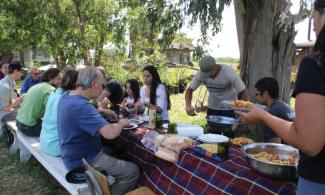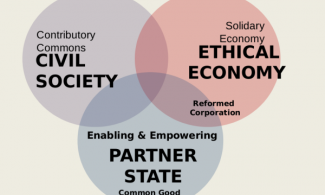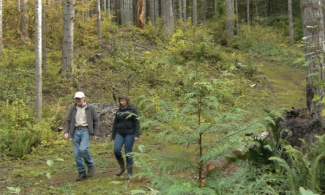Mother Earth, states and commons: reflections on "el cumbre"
The Commoner editor, Massimo De Angelis reported on The People's World Conference on Climate Change and the Rights of Mother Earth, in short, El Cumbre, held in Cochabamba, Bolivia this past April 19-22. (El Cumbre for those of you like me who don't know Spanish, means "the Summit.")
You may be thinking that April was a long time ago, and what you want is some fresh stuff from this past week. Forget about it. I promise that you will find this rather detailed report with substantial interpretations of its long term significance worth more than anything that came out this past week.
Here I want to highlight some key parts of his report. He starts with some historical backgound:
Fifteen years ago, I attended the First Encuentro for Humanity against Neoliberalism, called by the Zapatistas and held in the Lacandonian jungle, Chiapas, Mexico...It planted the seed of the commons into political processes, which, especially in the West, at the time where dominated by the self-imposed ghettos of identity politics and "identity-ideologies". In fifteen years, this seed has grown through encuentros, nurtured by collectives, flourished in social flora and social movement assemblies
Later, looking toward the future, he points out the historical significance of El Cumbre:
Indeed, one of the things that most impressed me of this conference is the political genius of this president and his team in bringing together a diverse global social movement and finding a way to articulate its energies, expertise and powers to a political process dominated by state politics, i.e. the UN decision making on climate change. And we definitively needed something like this, because unlike the successful struggles against WTO or neoliberal globalisation in the past years, here the social movements do not simply want to wreck negotiations and to say "no" to a model of capitalism (neoliberalism). Here the social movements want concrete actions that not only are up to the task of drastically and rapidly reducing greenhouse gasses emissions, but also and at the same time that are socially just.
Then he identifies the common ground shared by the participants from all over the world:
Evo Morales was definitively right in saying that the difference between the meetings in Copenhagen and in Cochabamba is that we were debating here the causes of the climate change, and not only the effects, and that the causes have a lot to do with the system of boundless accumulation we know as capitalism. And when boundlessness is acknowledged, it is as easy as 1+1 = 2 to say that finite earth is threatened by such a system. "Either capitalism dies, or mother earth dies" or "either capitalism lives or mother earth lives", as Evo put it in his speech. No, there is no much room for playing the postmodern game here and denounce the polarity. As the newspaper Opinion titles in its resume at the end of the conference (25 April), "everybody against capitalism" seem to be the clear common ground at this conference, a sentiment so strong, that even the representatives of mainstream NGOs did not dare to question it.
Finally, Massimo spells out the challenge that the results of this historic conference for activists in the North-that's us. It made some heavy demands on the North without dealing with the consequences these demands would lead to. Massimo points these out and claims that we here in the North are faced with choosing between some kind of green fascism or getting our asses in gear with producing the kind of radical change solidarity economics-or what he refers to as "promotion of the commons"-- calls for:
Now, to put it simply, it is clear that if we apply the results of the Cochabamba cumbre, there is some hope to save the world. However, one thing that the conference has not debated sufficiently, are the consequences of its demands, especially for the Global North...These demands, if met within current social relations of production, will have a drastic adverse social impact in the livelihoods of millions in the developed countries, simply because they de-facto imply a reduction in economic growth, and in the North, our livelihoods heavily depends on economic growth. What need to be spelled out clearly and worked upon by our movements, especially in the global North, is that we also know that economic growth and people livelihoods do not have to be the same thing, and people will pay the price only if the existing dominant modes of production and distribution driven by profit and articulated by capitalist markets is maintained. Therefore, unless we want to face our demands for climate justice with green fascism and austerity, we must accompany the struggles for these demands with the massive promotion of commons, that is with the construction of radically different practices to reproduce our livelihoods, at all scales of social action, including at the level of the state.
Read the whole blog > http://www.commoner.org.uk/blog/?p=243




Add new comment